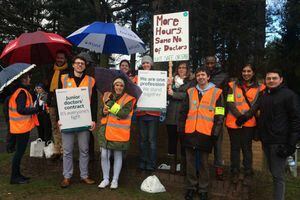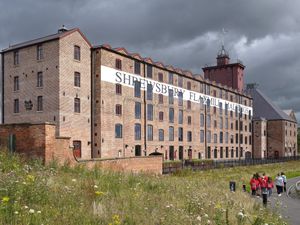Appointments and operations cancelled in Shropshire as junior doctors strike
About 100 patients had their medical appointments cancelled at Shropshire's two main hospitals today due to the nationwide junior doctors' strike.

Shrewsbury and Telford Hospital NHS Trust (SaTH) had to axe four planned inpatient procedures, along with about 100 outpatient appointments yesterday.
But the trust said almost 96 per cent of appointments at the Royal Shrewsbury Hospital and Telford's Princess Royal Hospital went ahead as planned.
Junior doctors went on strike for 24 hours across England in a protest over pay and a new contract.
Debbie Kadum, chief operating officer at SaTH, said: "We have worked hard to ensure the industrial action had the minimum impact on our patients.
"We have, unfortunately, had to postpone four planned inpatient procedures as a direct result of the action, along with about 100 outpatient appointments.
"However, almost 96 per cent of outpatient appointments have gone ahead as planned.
"Any patients affected were contacted in advance and we would ask any patients who have not been contacted to assume their appointment is going ahead as planned."
Disruption was less severe at Robert Jones and Agnes Hunt Orthopaedic Hospital NHS Foundation Trust (RJAH), which runs Oswestry Orthopaedic Hospital.
Ruth Tyrrell, associate director of human resources at RJAH, said: "We employ small numbers of junior doctors as our services are predominantly consultant-led. Therefore, there was a minimal impact on services as a result of Tuesday's industrial action."
David Cameron last night pleaded with the junior doctors to call off their "damaging" strike, saying it would cause "real difficulties" for patients and "potentially worse".
He said: "This strike will be damaging. We are doing everything we can to mitigate its effects but you can't have a strike on this scale in our NHS without there being some real difficulties for patients and potentially worse."
The Government says it is a simple pay dispute. The British Medical Association claims it is about patient safety. So why exactly are junior doctors on strike today?
There is no simple answer. Today's walk-out is the result of a dispute about proposed contract changes which has been rumbling for nearly four years, and has its origins in the Government's pledge to offer a fully functional NHS seven days a week.
In 2012 a study, co-written by NHS England medical director Sir Bruce Keogh, highlighted the increased risk of death for patients admitted at weekends compared to a Wednesday.
Around the same time, ministers drew up plans for a new contract for junior doctors, saying the existing contract – drawn up in the 1990s – was unfair and outdated.
At the end of 2013 Sir Bruce published a second report, calling on the NHS to adopt 10 standards to improve the quality of care available at weekends. These included everything from greater consultant availability to increased access to diagnostic tests.
With this in mind, the new contract was drawn up. On the positive side the Government said this would include an 11 per cent rise in basic pay, but the trade-off is a reduction in the number of hours in the working week which are classified as "unsociable", and therefore attract bonus pay.
Guaranteed pay increases linked to time in the job are also being scrapped and replaced with a system linked to progression through set training stages.
This, the BMA argues, affects mothers who take time out to have a baby.
The term "junior doctors" is somewhat misleading, and includes all hospital medics below the rank of consultant, from new graduates to those with more than a decade in the front line.
Under the present contract a newly qualified doctor will earn a basic salary of just under £23,000 a year, but the extra payments for unsociable hours will usually see this top £30,000 – according to NHS Employers, a doctor during their first two years of "foundation training" – will receive just over £36,000 a year.
Health Secretary Jeremy Hunt has pledged that no doctor working a normal number of hours will be worse off, and the Government is claiming that three-quarters will actually be better off. But the real bone of contention is that the changes have been designed to make it cheaper to deploy extra doctors at weekends. In other words, junior doctors will be working more weekends without any extra pay.
The Government has said the new contract will be imposed in August if an agreement is not reached. Doctors in Shropshire have described the new contract as both unfair and unsafe.
Dr Mary McArthur, who represents the BMA on Shropshire's GP committee, said: "The current position comes about because of a fundamental breakdown in trust with junior doctors, who feel their position is being misrepresented.
"The threat to patient care comes from the removal of safeguards which would prevent doctors working dangerously long hours. A tired doctor is at risk of making clinical judgements which may not be safe. Airlines will not let their pilots work over the allowed time even if it means passengers have to wait for a new crew. Hospitals should have similar safety measures."
Junior doctors were expected to provide just emergency care only for 24 hours from 8am this morning.
This is due to be followed by a 48-hour stoppage and the provision of emergency care only from 8am on January 26.
On February 10, doctors are threatening a full withdrawal of labour from 8am to 5pm.
Dr Edwin Borman, medical director at SaTH, said: "As with the announcement last November, we recognise that this period of national industrial action will lead to some concern among our patients.
"But I can once again assure them that we are working hard across both our hospitals to ensure that any impact on patients is kept to a minimum. Our discussions with the BMA and our junior doctors have been very positive and we are all clear that we will work together to ensure patient safety."
Talks have been ongoing between the Government and union representatives over the offer of an 11 per cent rise in basic pay for junior doctors. But the plans also include cutting the number of hours at a weekend for which they can claim extra pay for unsocial hours.
Dr Mark Porter, BMA council chair, said: "We sincerely regret the disruption that industrial action will cause, but junior doctors have been left with no option."





